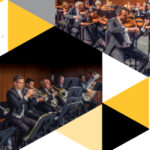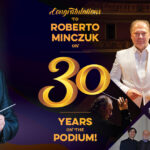Program Notes, ©2013 Lori Newman
Program Notes
Mikhail Ivanovich Glinka Overture to Ruslan and Lyudmila (1837 – 1842)
(Born 1804, Novospasskoye, Smolensk district, Russia; died 1857, Berlin, Germany)
Mikhail Glinka was never supposed to be a composer, but due to several felicitous and timely twists of fate, he not only became a composer, but became a nationalist composer whose works influenced the likes of Mussorgsky, Borodin, and Rimsky-Korsakov. Glinka was born to a wealthy family and was destined for a life in government service, at the insistence of his father. He informally studied music beginning in his childhood, and while he held down his government job, he continued to write and study music. He was particularly struck by the folk music of his native Russia.
In 1830, he traveled to Italy and met the great Italian opera composers, Bellini and Donizetti, and talked with them about opera. Glinka began thinking of ways to synthesize Italian drama and Russian folk music. In 1834, Glinka’s father died and he immediately began work on his first opera, A Life for the Czar, which premiered in 1836 and was a huge success.
His second opera, Ruslan and Lyudmila, was based on the satirical fairy tale of the same name by Alexander Pushkin. Pushkin was to write Ruslan’s libretto, but died before he could begin the project. The opera premiered on December 9, 1842, at the Bolshoi Theatre in St. Petersburg, Russia. While Ruslan and Lyudmila is rarely staged outside of Russia, the opera’s effervescent overture is a mainstay on the concert stage.
Pyotr Ilyich Tchaikovsky Piano Concerto No. 1 in Bb minor, op. 23 (1874)
(Born 1840, Votkinsk, Russia; died 1893, St. Petersburg, Russia)
Unplayable. That was the takeaway that Tchaikovsky received when he asked the respected Russian pianist, Nikolai Rubinstein, to critique his newly written Piano Concerto. The unpleasantness began when Tchaikovsky and Rubinstein agreed to meet at the Moscow Conservatory on Christmas Eve in 1874. Tchaikovsky had never composed for piano and orchestra and asked for Rubinstein’s opinion on the pianistic elements of the concerto. What ensued is legendary; Tchaikovsky’s account is the following:
I played the first movement. Not a word, not a single remark. To understand how stupid, how embarrassed I began to feel, imagine what it is like to prepare a meal for someone who then eats in silence…I fortified myself with patience and played through to the end. Still silence. I stood and asked, ‘Well?’ Quietly at first, but gradually increasing in volume until it had assumed the tone of thundering Jupiter [Zeus in some translations], a torrent of vitriol poured from [Rubinstein’s] mouth. My concerto was unplayable and worthless; passages were so clumsy, so fragmented and crudely conceived as to be beyond rescue; the whole was vulgar and badly written; here and there I had stolen from other composers; only one or two pages were worth anything, the rest should be scrapped. ‘For instance this — and that,’ and he then caricatured the passage on the piano…I was not only astounded but deeply mortified by the whole scene. I had sought friendly counsel and criticism; I require these and am always glad to receive them. But there was nothing friendly in these proceedings. The censure was delivered in such a form that it cut me to the quick.
Tchaikovsky immediately left the hall; Rubinstein followed, trying to mitigate some of his harsh words, but it was too late, the self-conscious and highly sensitive Tchaikovsky had heard enough.
Tchaikovsky then sent his Piano Concerto to the German pianist and conductor, Hans von Bülow, who was a known fan of Tchaikovsky’s music. Von Bülow wrote a response so opposite of Rubinstein’s, it is almost comical:
The ideas are so original, so powerful; the details are so interesting, and though there are many of them they do not impair the clarity and unity of the work. The form is so mature, so ripe and distinguished in style; intention and labor are everywhere concealed. I would weary you if I were to enumerate all the characteristics of your work, characteristics which compel me to congratulate equally the composer and those who are destined to enjoy it.
Von Bülow then told Tchaikovsky that he would like to take the concerto on his upcoming American tour, to which Tchaikovsky enthusiastically agreed. There is some speculation as to whether Tchaikovsky’s enthusiasm for the work to be premiered in America was possibly because Rubinstein’s words were still in his head, and the composer felt it was safer to have the concerto premiere a world away rather than close to home. Whatever the reason, Tchaikovsky’s Piano Concerto No. 1 was premiered in Boston on October 25, 1875. In a musicological version of “eating crow,” one of the work’s champions eventually became none other than Nikolai Rubinstein.
Nikolai Rimsky-Korsakov Scheherazade (1888)
(Born 1841, Tikhvin, Russia; died 1908, Lyubensk, Russia)
All of Nikolai Rimsky-Korsakov’s works show his brilliance at orchestration and use of orchestral color, but perhaps none as profoundly as the orchestral suite Scheherazade. The program is based on the Middle Eastern and South Asian stories and folk tales, The Arabian Nights. Rimsky-Korsakov included the following summary for the premiere of the work: “The Sultan Schahriar, persuaded of the falseness and faithlessness of women, has sworn to put to death each one of his wives after the first night. But the Sultana Scheherazade saved her life by interesting him in tales she told him during 1,001 nights. Pricked by curiosity, the Sultan put off his wife’s execution from day to day, and at last gave up entirely his bloody plan.” The work is comprised of four of Scheherazade’s grand tales to the Sultan. While the music has a programmatic element, it is not necessarily a congruent narrative of the stories. Rimsky-Korsakov later stated that Scheherazade should be considered an orchestral suite with an unspecified Oriental program.
The four stories of Scheherazade used for the suite are: The Sea and Sinbad’s Ship, The Story of the Kalender Prince, The Young Prince and the Young Princess, and Festival at Baghdad – The Sea – Shipwreck. The two main characters’ themes are presented immediately in the first movement. The sultan is represented with the ominous theme in the opening brass statement, and Scheherazade is portrayed by the serpentine melody of the solo violin.
Rimsky-Korsakov’s legacy of orchestration can be found in future composers from all nationalities and styles. The influence of Scheherazade specifically, is seen in the works of Debussy and Ravel: A fragment from the second movement is found in both La Mer by Claude Debussy and Daphnis et Chloé by Maurice Ravel.




